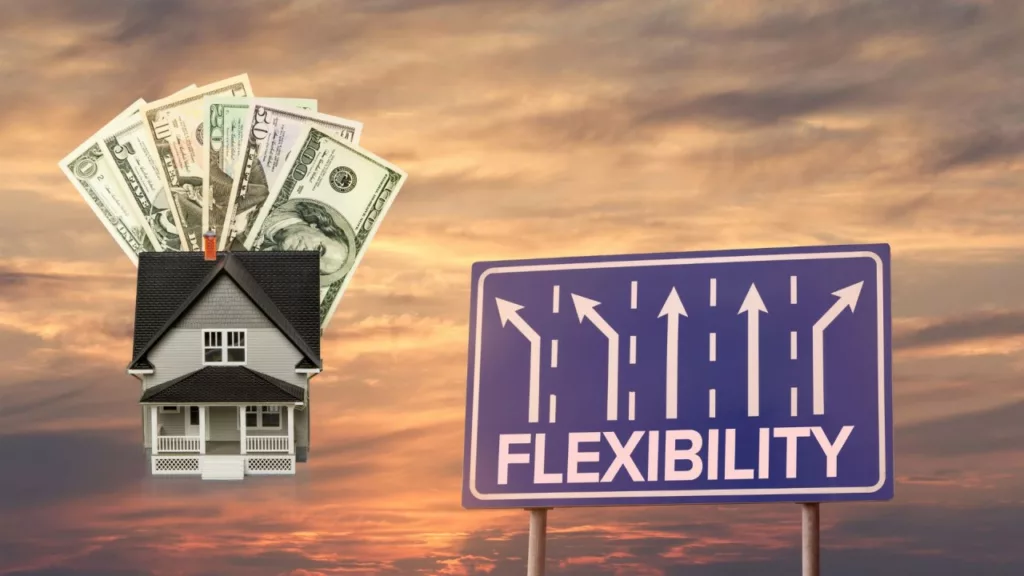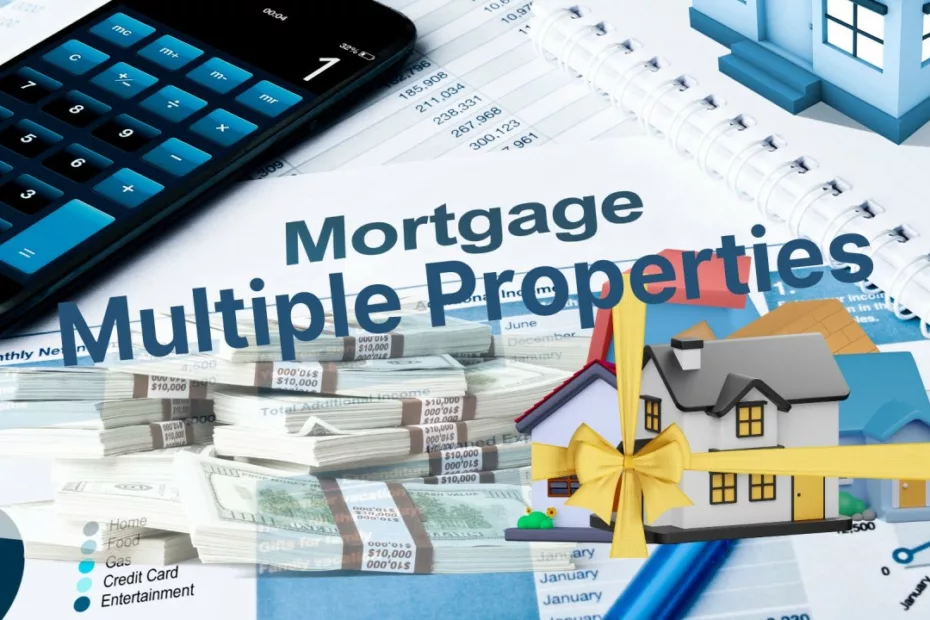Getting a loan on multiple rental properties differs from getting a mortgage on your first property. As the number of properties and mortgages increases, you must look at different tactics to secure funding. I faced these challenges years ago, and now I know all about getting a loan on multiple properties, and I am here to share it with you.
To get a loan for multiple rental properties, you should seek commercial loans from small community banks. Whether that is one loan on several properties or multiple individual loans, working with a community bank is the way to go.
Funding the growth of your rental property portfolio is challenging. There is a lot to learn when you first start, and you have learned that by now. By this stage, you have your first property and a thorough understanding of the process. It would be fantastic if you could replicate that process, but lending requirements hamper your growth. Your funding strategy is another complex hurdle in your real estate investing career, but I am past that point and will show you how to clear that hurdle.
Funding Challenges for Multiple Properties

A traditional mortgage refers to a home loan that follows the standard guidelines and terms set by financial institutions, offering borrowers lower interest rates than alternative financing options. These mortgages are typically obtained through local banks, credit unions, or mortgage brokers.
Traditional mortgages are suitable for purchasing or refinancing residential properties like single-family homes. Good credit, a down payment, and meeting specific requirements are essential factors in securing a traditional mortgage, which often comes with longer terms and monthly payments spread over time.
Number of TRADITIONAL MOrtgages
As the number of mortgages increases, lenders become more cautious in their underwriting process. They scrutinize credit reports, financial statements, debt-to-income ratios, and the borrower’s ability to handle additional mortgage payments.
Lenders may require larger down payments on investment properties, which can tie up a significant amount of your available cash. Higher down payments are intended to reduce the lender’s risk and provide a cushion against potential losses.
Fannie and Freddie
Fannie Mae and Freddie Mac, short for the Federal National Mortgage Association (FNMA) and the Federal Home Loan Mortgage Corporation (FHLMC), respectively, are government-sponsored enterprises (GSEs) are government-sponsored enterprises that purchase mortgages from other banks. Established by Congress, their primary role is to provide stability and liquidity to the mortgage market by buying and guaranteeing mortgages from lenders.
Fannie Mae and Freddie Mac play a significant role in the housing finance system by creating a secondary market for mortgage loans. They buy mortgages from lenders, including banks, credit unions, and other financial institutions, which allows these lenders to replenish their funds and continue offering mortgages to homebuyers. By purchasing these mortgages, Fannie Mae and Freddie Mac provide lenders with capital to issue new loans, increasing mortgage credit availability.
Fannie Mae and Freddie Mac package the purchased mortgages into mortgage-backed securities (MBS). These MBS are then sold to investors in the global financial markets, providing a steady flow of funds back to the mortgage lenders. By doing so, Fannie Mae and Freddie Mac help ensure the continuous availability of affordable mortgage financing for homebuyers.
Fannie Mae and Freddie Mac guidelines are crucial for traditional mortgage lenders because they provide a framework for lending practices. These guidelines help ensure consistency, reliability, and risk management in the mortgage market. As a result, traditional lenders primarily make loans that conform to these guidelines.
Ten-MOrtgage Limit
Traditional mortgage lenders ensure that their loans conform to the Fannie/Freddie guidelines for various reasons, and these guidelines state that a borrower may not have more than ten mortgages. As a result, once you reach this ten mortgage limit, you will be cut off from this long-term, low-rate funding source.
The ten-mortgage limit exists to mitigate risk for Fannie Mae and Freddie Mac. These entities aim to ensure the housing market’s stability and protect themselves from potential losses from defaulting mortgages. By restricting the number of mortgages a borrower can have, they reduce the likelihood of excessive indebtedness and minimize the risk associated with investment properties.
The ten-mortgage limit directly impacts real estate investors seeking financing for their growing investment portfolio of rental properties. Obtaining traditional conforming mortgages from conventional lenders, such as big banks and credit unions, becomes increasingly challenging as you approach or reach this limit.
Single Property Limit
The Fannie/Freddie guidelines also require conforming mortgages to be secured by a single property. As a result of this rule, a single conforming mortgage cannot be made on a portfolio of properties. As mentioned above, traditional lenders only make loans that conform to the guidelines. If you are buying a package of rentals, you will need to look elsewhere for funding.
As you take on more mortgages, your debt-to-income ratio (DTI) will likely increase because many rental properties show a loss after depreciation and have little or no income to offset the payment incurred. DTI is a critical component of the conforming mortgage, and lenders want to be sure you have the funds to repay your loan, and this can make it challenging to qualify for additional mortgages.
Community Banks to the Rescue

There are drawbacks to using a large traditional lender. The good news is that a local bank is often the right lender to solve your problems. Their commercial real estate loans are tailored for the residential real estate investor.
Community Banks primarily serve the needs of individuals and businesses within a specific geographic area, such as a town, city, or region. These local banks provide various loans and typically have more flexibility in their lending criteria. Their lending predominantly comprises commercial loans that do not need to conform to the Fannie Mae/Freddie Mac guidelines.
Whether you are buying a single property after reaching the ten mortgage limit, or a group of rental houses, a commercial loan from a local community bank is the best way to go. In addition, these banks will often lend against a portfolio of existing homes.
The loan officers at community banks are skilled at examining business financials and understand that depreciation isn’t an actual cost. They know how your debt-to-income ratio is affected by investment properties and will adjust their requirements as needed.
Blanket Loan
A blanket loan, also known as a blanket mortgage, is a versatile financing option that allows borrowers to secure a single loan using multiple properties as collateral. This type of loan is particularly beneficial for investors with diverse investment portfolios or those looking to acquire multiple rental properties.
A blanket loan offers several advantages for real estate investors. It simplifies borrowing by consolidating multiple properties under one mortgage, reducing paperwork and administrative tasks associated with managing individual loans. This streamlined approach saves time and effort, allowing investors to focus on their investment strategies.
Below are some features of a blanket loan.
- Collateral and Property Types: Blanket loans utilize multiple properties as collateral, including various property types such as residential homes, commercial buildings, or a combination thereof. This diverse collateral base strengthens the borrower’s position.
- Simplified Mortgage Structure: Blanket loans consolidate all properties into a single mortgage rather than managing separate mortgages for each property. This consolidation means borrowers have one payment and one set of loan terms for all properties the blanket loan encompasses.
- Flexibility: Blanket loans offer flexibility by allowing borrowers to add or remove properties from the loan. As properties are sold, they can be removed from the loan.
- Loan Parameters: The loan amount for a blanket loan is typically determined based on the combined value of the properties included. Loan terms, including interest rates, repayment period, and loan-to-value ratio, are established based on the borrower’s financial profile and the lender’s requirements.
- Risks and Benefits: While blanket loans provide convenience and the ability to finance multiple properties with a single loan, they also entail certain risks. If one property experiences financial difficulties, it can impact the entire loan and put all properties at risk of foreclosure.
Cross Collateralization
Cross-collateralization refers to the practice of using an asset that is already serving as collateral for one loan as collateral for another loan. This strategy allows lenders to have additional security if the borrower defaults on either of the loans. Cross-collateralization can be applied to various financing options, including investment property loans.
When cross-collateralization is implemented, the borrower’s assets, such as residential rental properties, can simultaneously be used as collateral for multiple loans. For example, a borrower may use their primary residence as collateral for a mortgage loan and also use it as collateral for a rental property loan. This enables the borrower to leverage their existing assets to secure financing for multiple real estate investments.
Cross-collateralization aims to provide lenders with a higher level of assurance and mitigate the risks associated with lending. However, it is essential to note that cross-collateralization can have specific implications for borrowers. For instance, if one of the loans becomes delinquent or the borrower defaults, the lenders have the right to liquidate the assets used as collateral to recover their losses.
With an extensive rental portfolio, cross-collateralization is an excellent way to secure a credit line. Community banks often give a line of credit backed up by the equity in properties used for collateral on other loans. This credit line can be used to quickly purchase new properties without a down payment or waiting for loan approval.
Superior Underwriting
Mortgage underwriting is the process of evaluating a borrower’s financial information, creditworthiness, and financed property to determine the risk in granting a mortgage loan. It consists in assessing factors such as income, credit history, assets, and property appraisal to make an informed decision about approving or denying the loan application and determining the terms and conditions of the mortgage.
Community banks are often better at mortgage underwriting and analyzing business financials in complex situations than large mortgage companies. This is due to their local market knowledge, personalized approach, and ability to understand the unique needs of borrowers with investment properties, rental income, or complex financial portfolios.
They offer a broader range of loan programs, including portfolio loans and investment property mortgages. In addition, they can provide more flexible terms based on their understanding of the local real estate market and individual borrower circumstances.
- Local Knowledge and Personalized Service: Community banks leverage their deep understanding of the local market and established relationships with real estate investors to provide personalized service tailored to their needs. These community banks can offer customized loan solutions tailored to the unique needs of real estate investors.
- Flexibility in Underwriting: Unlike large mortgage companies, community banks can take a holistic approach to their underwriting processes. They excel at considering factors beyond credit scores and income statements. They assess the overall financial picture, including cash flow, assets, and collateral, enabling them to make informed lending decisions.
- Relationship-Oriented Approach: Community banks prioritize building relationships with customers, taking the time to understand their unique circumstances, goals, and plans. This allows them to offer customized solutions and work closely with borrowers to find the best financing options for their needs, fostering long-term partnerships.
- Local Decision-Making Authority: With local decision-making authority, community banks empower individuals familiar with the local market to make loan decisions. This enables quicker decision-making and greater flexibility in structuring loan terms to accommodate borrowers’ circumstances, leveraging their understanding of the community’s needs.
- Emphasis on Small Business and Real Estate: Community banks specialize in serving small businesses and real estate investors. These banks dedicate teams with expertise in evaluating the financials of these sectors. This specialization equips them to assess better the risks and opportunities associated with real estate borrowers, providing tailored financial solutions.
- Understanding Complex Financials: Large traditional banks specialize in underwriting owner-occupied properties for borrowers with W-2 income. Community banks better understand how to evaluate business financials. For example, they know why depreciation expense is excluded when calculating the debt-to-income ratio.
Selecting a Community Bank
From my experience, the smaller the community bank, the better it is for you. The overall experience at these small banks is superior to a giant bank, and you will feel like they want your business.
Often, at a huge bank, their attitude is that they are doing you a favor by making the loan. Lending on even one house is substantial to a small bank, but as the bank gets large, the business from these loans is less significant.
When looking for an investment property loan, you should find the smallest community bank in your area. These banks tend to be eager for your business and will work hard to make investment loans. Building relationships and many community banks will help you grow your real estate investment business.
Line of Credit

A line of credit is a flexible borrowing arrangement that allows access to funds up to a predetermined limit. It functions like a credit card, providing the option to borrow and repay multiple times within the specified limit. With a line of credit, interest is only charged on the amount borrowed.
The funds obtained through a line of credit can be used for any purpose, offering borrowers significant flexibility. One notable advantage of a line of credit is the ability to use the funds to purchase a house or investment property without going through the traditional loan underwriting and appraisal process. This is because the line of credit is secured by existing properties or other collateral, eliminating the need for extensive documentation and evaluations.
This streamlined approach can save time and provide more flexibility for real estate investors looking to make quick purchases or bypass specific loan requirements. In addition, investors can use a line of credit to buy multiple properties.
When an investor has a blanket mortgage with several properties, they acquire equity by paying down the loan balance. Investors have more equity in these encumbered properties as the loan balance decreases. Commercial banks often give investors a line of credit secured by the equity in these properties. In other words, an investor can obtain a line of credit only using properties already used as collateral.
FAQ
Can you have one mortgage for multiple properties?
It is possible to have one mortgage for multiple properties. This type of loan is called a blanket mortgage or a portfolio mortgage.
Can you sell one property in a blanket loan?
It is possible to sell a property that is used as collateral in a blanket mortgage. The lender usually requires a portion of the sale proceeds to pay down the mortgage balance. This reduces the mortgage balances, reduces the sold property, and the other properties remain as collateral for the loan.
How many investment properties will Fannie Mae allow?
Fannie Mae allows borrowers to have up to 10 financed investment properties. Individual lenders sometimes impose tighter restrictions than the Fannie Mae guidelines. After that, borrowers must turn to other methods to grow their investment portfolio.
What is a piggyback mortgage loan?
A piggyback loan is a second mortgage made simultaneously with the first mortgage. It allows the buyer to reduce their cash-out-of-pocket by using processed from the piggyback mortgage for the downpayment.
What is a swing loan?
A swing or bridge loan is a short-term loan used until permanent financing can be arranged. In real estate transactions, it is often used to purchase a property before another can be sold.
What is a Hard Money Loan?
A hard money loan is a short-term, high-interest loan secured by real property. Unlike traditional loans, hard money loans do not rely heavily on the borrower’s creditworthiness or financial situation. Instead, the loan is primarily based on the property’s value. Real estate investors often use hard money loans for transactions such as flipping or purchasing properties needing renovation.
Hard money loans are typically provided by private investors or companies rather than traditional banks. In the event of default, hard money lenders can quickly foreclose on the property to recoup their losses. To learn more, read the comprehensive guide to hard-money loans.
Conclusion
Navigating the world of financing for multiple rental properties requires careful consideration and understanding various loan options. Conventional mortgages offered by banks and credit unions are a good option for financing your first rental property. As you expand your real estate investment portfolio, you may encounter limitations imposed by Fannie Mae guidelines, limited cash reserves, or the ten-mortgage limit.
In such cases, alternative financing options like hard money loans, seller financing, or portfolio lenders can provide flexibility and higher rates, allowing you to leverage the potential of your real estate assets.
Conforming mortgages are outstanding when you can get them. They come with the lowest interest rates and the longest repayment term, which will help your property’s cash flow. However, this mortgage must meet unsuitable guidelines for real estate investors. The solution is to work with a community bank when your needs eclipse the services provided by traditional mortgages.
Community banks excel at evaluating a business’s complex financial reports and often lend money that doesn’t conform to the Fannie Mae and Freddie Mac guidelines. As your rental property assets increase, It’s essential that you establish a relationship with a local community bank. Please look at my companion article that explains why it’s harder to get a loan on a rental houses.




